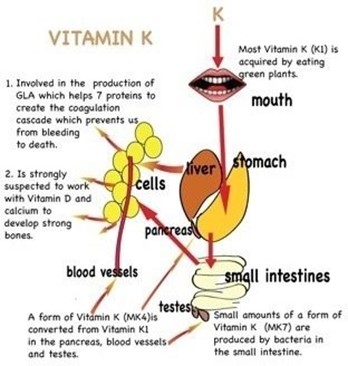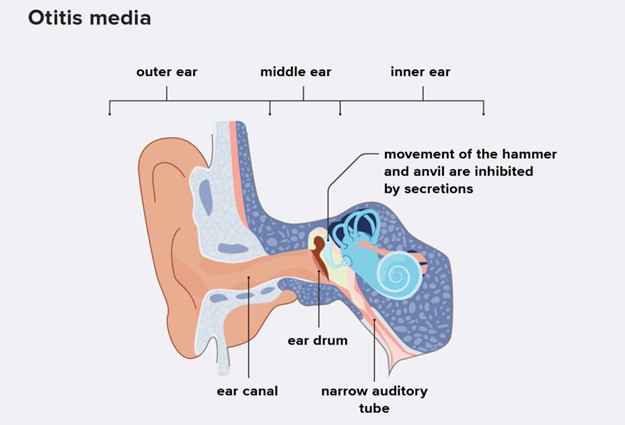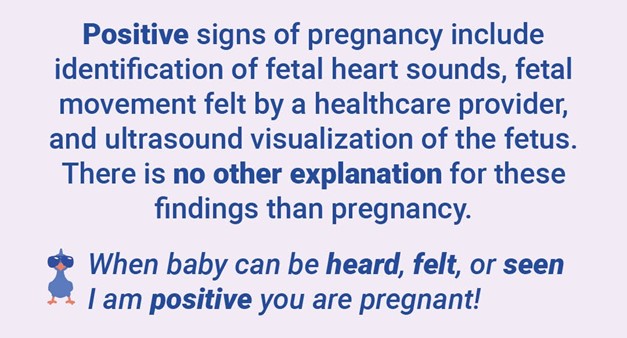The nurse administers vitamin K to the newborn for which reason?
Most mothers have a diet deficient in vitamin K, which results in the infant’s being deficient.
Vitamin K prevents the synthesis of prothrombin in the liver and must be given by injection.
Bacteria that synthesize vitamin K are not present in the newborn’s intestinal tract.
The supply of vitamin K is inadequate for at least 3 to 4 months, and the newborn must be supplemented.
The Correct Answer is C
Bacteria that synthesize vitamin K is not present in the newborn’s intestinal tract. Vitamin K is essential for blood clotting, and newborns are at risk of bleeding problems due to their lack of vitamin K. Therefore, vitamin K is given by injection to prevent hemorrhagic disease in the newborn.

Choice A is wrong because most mothers do not have a diet deficient in vitamin K, and vitamin K deficiency in newborns is not related to the maternal diet.
Choice B is wrong because vitamin K does not prevent the synthesis of prothrombin in the liver, but rather enhances it. Prothrombin is a clotting factor that requires vitamin K for its production.
Choice D is wrong because the supply of vitamin K is not inadequate for at least 3 to 4 months, but rather for a few days until the newborn’s intestinal bacteria start producing it.
Nursing Test Bank
Naxlex Comprehensive Predictor Exams
Related Questions
Correct Answer is D
Explanation
Chronic otitis media with effusion (OME) is a condition where fluid accumulates in the middle ear without signs of infection.

This can cause hearing loss, speech delay, and balance problems. The child may complain of a feeling of fullness or pressure in the ear.
Choice A is wrong because a fever as high as 40° C (104° F) is a sign of acute otitis media, which is an infection of the middle ear with inflammation and pus formation.
Choice B is wrong because severe pain in the ear is also a sign of acute otitis media, not chronic otitis media with effusion.
Choice C is wrong because nausea and vomiting are not typical symptoms of chronic otitis media with effusion. They may be associated with other conditions such as gastroenteritis or vestibular disorders.
Correct Answer is ["A","B","C","D"]
Explanation

These are all positive signs of pregnancy, which are definitive and can only be explained by the presence of a fetus.A positive sign of pregnancy is fetal movement palpated by the nurse-midwife.
Choice E is wrong because a positive hCG test is a probable sign of pregnancy, not a positive one.A probable sign of pregnancy is strongly suggestive of pregnancy but could have other causes.A positive hCG test could be caused by medications, tumors, or other conditions that affect the level of hCG in the blood or urine.
Some other probable signs of pregnancy are uterine enlargement, Hegar’s sign (softening of the lower uterine segment), Goodell’s sign (softening of the cervix), Chadwick’s sign (bluish discoloration of the cervix), ballottement (rebound of the fetus when tapped by the examiner’s finger), Braxton Hicks contractions (painless, irregular uterine contractions), and positive pregnancy test.
Some other positive signs of pregnancy are identification of fetal heartbeat, visualization of the fetus by ultrasound or x-ray, and verification of fetal movement by an experienced clinician.
Whether you are a student looking to ace your exams or a practicing nurse seeking to enhance your expertise , our nursing education contents will empower you with the confidence and competence to make a difference in the lives of patients and become a respected leader in the healthcare field.
Visit Naxlex, invest in your future and unlock endless possibilities with our unparalleled nursing education contents today
Report Wrong Answer on the Current Question
Do you disagree with the answer? If yes, what is your expected answer? Explain.
Kindly be descriptive with the issue you are facing.
